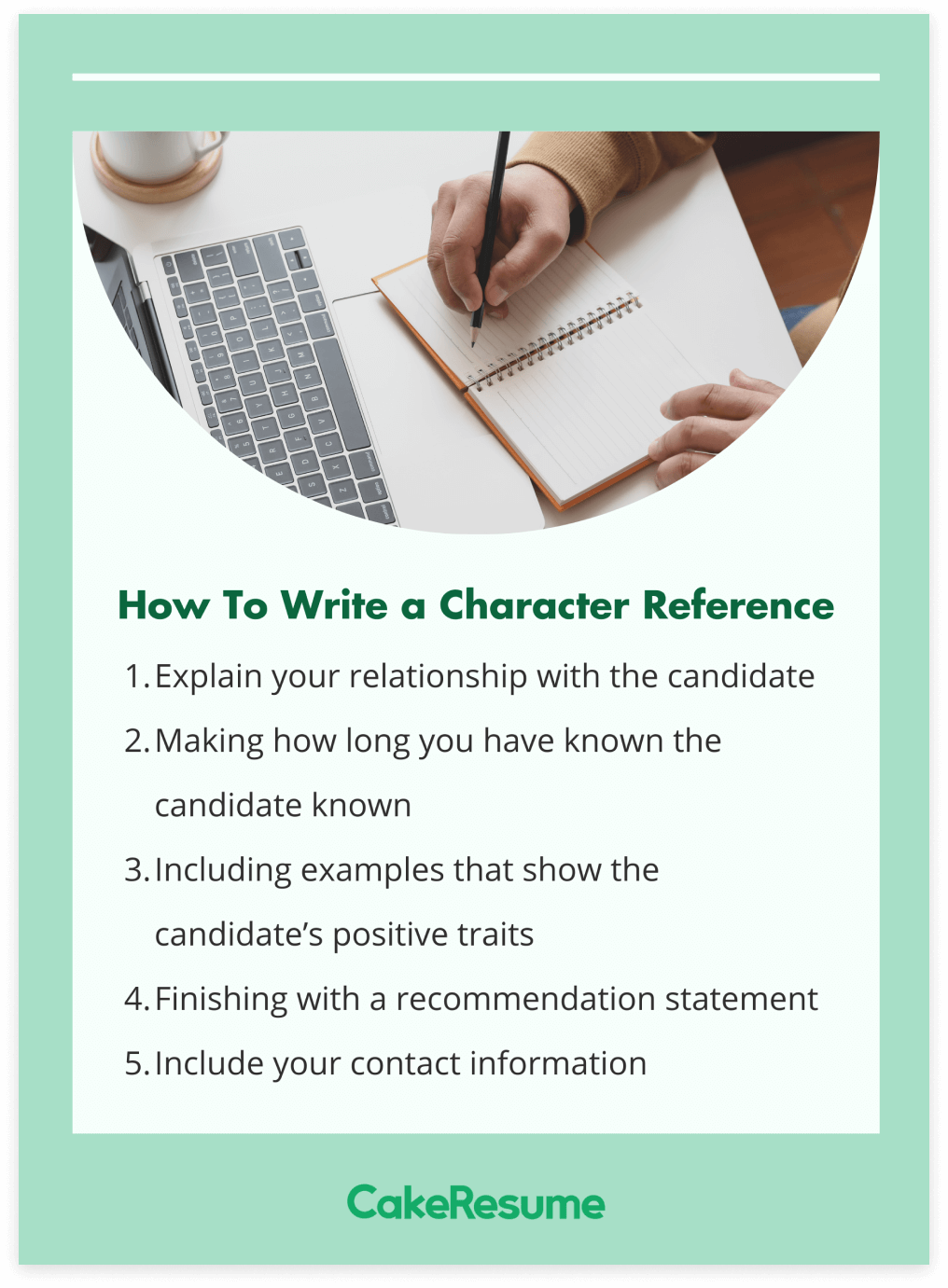Learn How to Write a Character Reference with Examples

In this article, we'll cover:
When it comes to reference letters, employers usually look for letters written by candidates’ senior colleagues, direct supervisors, or former managers. They provide information related to a candidate’s professional performance in a workplace, yet such professional references tend to overlook their fitness to the team and to the culture of the company.
Therefore, the employer sometimes asks for a character reference letter. A character reference or a personal reference letter is written for a friend, a co-volunteer, or any other members of your own personal association by someone who doesn’t know the candidate professionally but personally, or even dearly.
📍The Difference between a professional reference and a character reference
While professional references address one’s skills, work ethic, and professionalism in the context of work, a character reference takes into consideration of one's personal qualities such as integrity and character, and it is often written in the context that is outside of a work environment. You can ask for a character reference letter from your pastor, neighbors, or simply a friend.
What Is a Character Reference?
A character reference is a letter written by a referee who knows you and can attest to your personal quality, which explains why it is also called a personal reference or personal reference letter. One can also see it as a letter of recommendation for a friend.
A character reference letter is written by someone that has not worked with you on a professional basis but knows you on a personal level and can speak for your personal qualities, such as a friend or your academic advisor.
The hiring manager will use the character reference letter to evaluate a candidate’s compatibility with the existing team through different parameters besides skills and experience, such as candidate’s temperament, personal traits, and behavior.
Why Does the Interviewer Need a Character Reference?
If you are asked to write a character reference letter for a friend or the leader of your volunteering service, the very character letter gives valuable insights into the candidate’s character to the recruiter. The hiring manager or whoever requests the document uses the candidate’s character reference to understand the candidate better as the referee should endorse the positive traits that the candidate has, through examples from the personal relationship between the two.
In contrast to the professional reference in your resume that focuses on the candidate’s skills and experience, recruiters use the character reference in the resume to know whether the candidate possesses the personal traits that resonate with the role of the job and the company’s culture.
Since it is the goal for every recruiter to not only hire the most capable but also the most compatible employee for the position, a character reference serves as an additional document for the recruiters to have a better picture of how the candidate would fit in by providing the following aspects:
Role Assessment
What a professional reference often fails to indicate is the candidate’s fitness to the existing workforce and the company’s culture. The personal traits that a character reference enlists may serve as indicators to help the recruiter to understand the compatibility between the position and the candidate’s character.
Additional Perspectives
A professional reference speaks directly to your day-to-day work habits, whereas a character reference is a good way to add more insights to the candidate’s professional documents or to help the recruiter confirm their impression about you if not get better ideas about you.
Credibility
A character reference can also work as a third-party credential for the information written in the resume. If the recruiter can find consistency between referees’ inputs and the candidate’s professional representation, such character reference could potentially boost the credibility of the claims written in the resume.
How to Write a Character Reference?
It does not matter if you are the referee or the candidate in a character reference letter, the skill to compose a proper character reference is crucial to every professional personnel. It takes certain techniques and procedures to produce a successful character reference letter.
Before we show you the examples of a well-composed character reference, there are some principles to follow when writing a character reference. Therefore, we concluded the five following keynotes that your character letter should include in order to create a powerful character reference:
📝 Explain your relationship with the candidate
In the first paragraph of your character reference the referee should introduce themselves to the reader by stating the type of the relationship that you have with the candidate. It can be the friendship or mentorship between the two of you.
📝 Make how long you have known the candidate known
The next step is to let the reader understand the history of the relationship by briefly addressing how long you have known each other. For example, you can start your character letter by saying that you and the candidate have been in the same charity service for seven years.
📝 Include examples that show the candidate’s positive traits
A character reference should focus on three to five personal qualities and support these statements with positive examples from your own personal experience with the candidate, such as the candidate's work ethics that you have witnessed.
📝 Finish with a recommendation statement
Conclude your character reference by stating why the candidate is a good fit for the position. Your personal reaffirmation will render as a strong testimony for the candidate's application. For instance, you can recommend that the candidate’s attention to details will make themselves a perfect auditor.
📝 Include your contact information
Upon the completion of a character reference, include at least two to three specifications of your contact information, such as your phone number and Emails. If the recruiter needs further confirmation or details, it is your responsibility as a referee to collaborate.
Character Reference Examples
Here are two examples of character reference letters that adapt the above-mentioned principles,and they can be used as references when you are writing your own character reference. The first one will be a character reference letter for a co-volunteer while the second one is a character letter for a fellow student:
✉️ Character Reference Letter Sample 1
Dear Hiring Manager,
I have known Jason Wu for more than 6 years. We met each other at the animal shelter where we volunteered. He later helped me set up my work studio when I started my first business venture in 2016 by offering his assistance during the construction process and the preparation of the opening ceremony.
Jason is one of the most intelligent, meticulous, and hard-working people that I have ever collaborated with. At the same time, he is also kind, altruistic and extremely sympathetic towards others.
He is the kind of person that will put others’ needs before him. He used to sleep in the shelter for animals that were new to the place so that he could keep them company until the animals were familiar with their environment.
Jason’s attention to detail is so mesmerizing that he would often be asked to help the workers at the shelter review the various documentation of the animals and find inconsistencies in the text that no one would even notice, and that attention had never seemed to be distracted regardless of how chaotic the given situation was. As a result, his presence always brings a sense of confidence to the team.
Therefore, I recommend Jason for the position of the human resource manager. I believe any organization that would have him onboard can only benefit from his contribution and character.
If you have any questions, please feel free to contact me.
Sincerely,
Lisa Wagner
262-200-6459
[email protected]
✉️ Character Reference Letter Sample 2
Dear Admission Director,
Cara and I have known each other for more than three years. After we met in the chess competition host by the school, she offered to teach me how to improve my chess skills, and she later agreed to tutor me for calculus and other subjects that I had difficulty understanding.
Throughout our academic careers, I have always admired her for her positive attitude, leadership nature, and galvanizing passion. She has a personality that is so contagious that her presence in any study groups or project activities will almost create an ambience that compels you to engage and devote yourself.
For example, during one of our project activities, she was assigned as the leader of our group. After easily delivering the assignment with her incredible skills in task organization and time management, she then started to assist the host to help other teams to finish the project, and she was able to help the least performing team to finish the project in time with respectable results.
When she informed me about her decision in applying to your program, I knew she was going to be an excellent candidate for the position as a research assistant. As honored as I am to recommend her for this position, I can confidently attest her exceptional capability and personality.
If you have any questions, I will be happy to answer.
Kind Regards,
Thomas Smith,
210-200-4525
[email protected]
Tips for Writing a Successful Character Reference
When composing a character reference letter, there are some principles that you should keep in mind in order to write a character letter that will maximize the effect of your recommendation. In conclusion to what we have introduced so far, here are some takeaways for anyone who wants to write a perfect character reference:
1. Describe the Candidate Positively
When you are writing a character reference letter, it is a letter of recommendation for a friend. Therefore, the writer better make sure that it reflects the candidate’s personal traits and character in a positive manner.
2. Private Details Should Be Avoided
Although your character letter should include the personal qualities of the candidate, the referee should filter the examples and stories that they use in the character reference. Matters that are too intimate or personal should be avoided, as they might not necessarily be appropriate.
3. Be Concise
Since recruiters and the hiring managers usually have to evaluate dozens of resumes and character letters in a day, your character reference should not exceed more than one page to ensure that the recruiter will finish reading it in a reasonable timespan.
4. Specific Examples Are Crucial
A character reference or a personal reference letter provides important insights to the candidate’s character through examples from your personal experience with the candidate. Therefore, the referee should provide examples that can sufficiently back up the claim in the character reference letter.
5. Be Careful with Who You Write a Character Reference for
Avoid writing a character reference foryour immediate family, since your opinions of them can easily be considered biased. It will in turn damage the credibility of the character letter.
With CakeResume, you can easily create a resume online, free download your resume in PDF, and utilize ATS-compliant templates to create a resume. Create your resume online (free download) now and land your dream job!
--- Originally written by Jun Mao ---
More Career and Recruitment Resources

With the intention of helping job seekers to fully display their value, CakeResume creates an accessible free resume/CV/biodata builder, for users to build highly-customized resumes. Having a compelling resume is just like a piece of cake!






